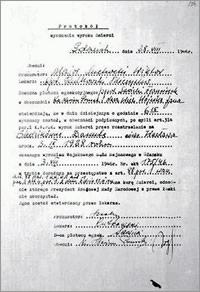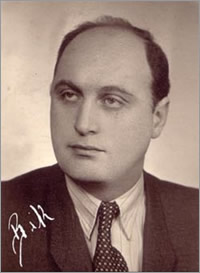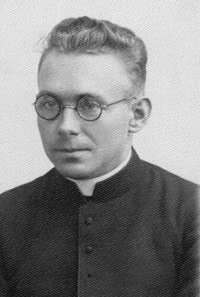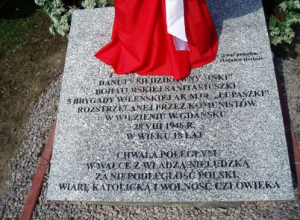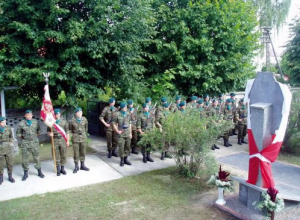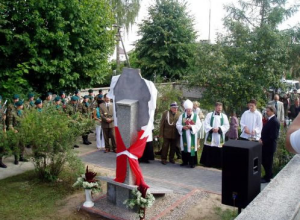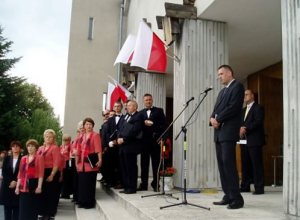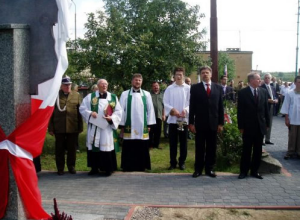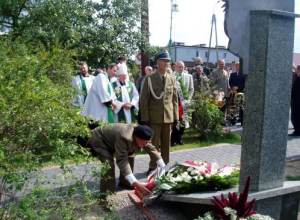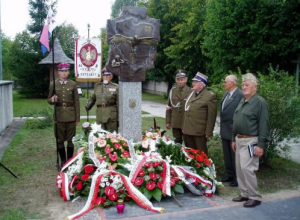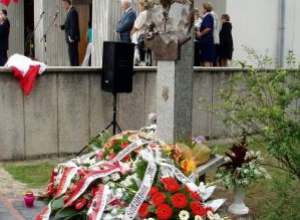 |
The Doomed Soldiers
|
 |
- Home
- Historical Background
- Introduction
- Resistance Organizations
- National Armed Forces (NSZ)
- Freedom & Independence (WiN)
- Protection Unit of DSZ/WiN
- Home Army In Nowogrodek Area After July 1944
- Home Army In the Wilno Area After July 1944
- Polish Underground Army (KWP)
- Narodowe Zjednoczenie Wojskowe (NZW)
- Ruch Oporu Armii Krajowej (ROAK)
- Armia Krajowa Obywatelska (AKO)
- V & VI Wilno Brigade of Home Army 1944-1952
- South-Eastern Kresy Units After 1944
- Saving the Europe's Jews
- Doomed Soldiers Memorial Day
- Communist Crimes
- Witold Pilecki - A Volunteer For Auschwitz
- Augustow Roundup In July 1945
- Augustow Roundup in Polish Press
- Augustow Roundup: Not Only Katyn
- Baran Forest | Kakolewnica Murders
- Execution of Inka And Zagonczyk
- Liquidation of the NSZ "Bartek" Unit
- Liquidation of the NSZ "Wiarusy" Unit
- Crimes In the Majesty of "Law"
- Polish Secret Police
- AK In NKVD/NKGB Reports
- Investigative Reports
- Propaganda Operations
- Relevant History Websites
- Recommended History Books
- Relevant Video / Fillm Footage
- Popular Culture
- The Crash of Flight PLF 101
- Smolensk Crash News Digest
- Polish Government TU-154M Crash Analysis
- Polish Plane Crash Analysis by Eugene Poteat
- Countdown to the Crash of Flight PLF 101
- "The Russians had the means, motive, and opportunity"
- Polish Air Crash: Crime Wihout Punishment
- Polish Plane Crash Disinformation Campaign
- Explosions On Board of TU-154 Before the Crash
- Was April 10, 2010 Crash An Assassination Plot?
- Smolensk: An Inconvenient Tragedy
- Russian Report Challenged by Danish Engineer
- Poland Tu-154 Pilots Were Expert Flyers
- The Macierewicz Commission Updates
- Independent Crash Investigation Updates
- Gazeta Polska: "The President Was Murdered"
- Last Speech - Lech Kaczynski's Katyn Speech
- "Letter from Poland", A Dutch TV Documentary
- Interviews With Victims' Families
- Smolensk Cover Up "Suicides"
- Soldiers
- Units & Operations
- Underground Operations
- About
- Site Help
- Contact
The Execution of Polish Underground Soldiers Danuta Siedzikowna "Inka" And Felix Selmanowicz "Zagonczyk" Related by Father Marian Prusak. (Pol. Egzekucja "Inki" i "Zagonczyka")
|
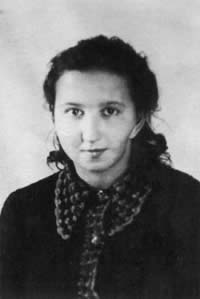 |
Danuta Siedzikowna “Inka”, daughter of Waclaw and Eugenia Siedzikow (born Tuminski), was born on 13 September, 1928 in Gluszczewina village near Narewka in the Belsk Podlaski district. She attended elementary schools in Olechowka, and thereafter preparatory elementary school ran by Sisters of Salezjanek Order in Rozany Stok near Grodno. In December 1943 she was sworn as a Home Army soldier. Her father, who was a forest-ranger was deported to the Soviet Russia. In 1941 he reached the General Anders Army, but died from exhaustion after reaching Teheran. Her mother was arrested in November 1942 and shot by Gestapo in September 1943 for collaborating with the underground. During 1944/1945 she underwent medical training. On June 6, 1945 she was arrested along with all employees of the forest inspectorate in Hainowka where she worked for aiding the "forest guerillas" (pol. "oddzial lesny" - Polish Armed Underground Units). While being transported to the UBP (pol. Urzad Bezpieczenstwa Publicznego - Ministry of Internal Security) headquarters in Bialystok she was freed along with a group of prisoners by the reconnaissance unit of the 5th Wilno Brigade of Home Army (AK), at that time subordinated to the Command of the Bialystok Region of Home Army lead by Stanislaw Wolonciej "Konus". |
Under protection of Waclaw Beynar "Orszak" the freed prisoners reached the brigade's temporary locale in Spieszyn commanded by Major Zygmunt Szendzielarz "Lupaszka". After joining the unit she began her military service as a medic, under code-name "Inka". She fought in squadrons commanded by Lieutenant Jan Murk "Piast" and thereafter under Lieutenant Marian Plucinski "Mscislaw". In September 1945, after the brigade was disbanded, she traveled to Osztyn where she worked at the forest inspectorate in Milomlyn near Ostroda ,under assumed name "Danuta Obuchowicz".
However, already in January 1946, after the activities of the brigade were resumed (this time subordinated anew to the Extraterritorial District of Home Army in Wilno region), she began her military service as a nurse in the squadron of Second Lieutenant Zdzislaw Badocha "Zelazny", where she also served as a courier. "Inka" took part in many military operations surprising her commanding officers with her valor and caring - she tended not only to the wounded partisans, but also to the members of the People's Militia and soldiers of the communist Polish People's Army. On July 13, 1946 she received orders from the new commanding officer of her squadron, Lieutenant Olgierd Christa "Leszek" , to travel to Gdansk and procure new medical supplies and field dressings, and to secure replacement field maps. She was also to learn about medical condition of "Zelazny". She was arrested sometime in the late evening hours of July 19 or early [morning] hours of July 20,1946 as a result of information obtained by the UB from the arrested earlier nurse Regina Zylinska-Modras, code name "Regina". During the interrogation, "Inka" did not reveal even a single secret about her squadron, nor did she reveal any information about their whereabouts. Her expedited trial took place on August 3, 1946 in a prison before a District Military Court. She was accused, among other things for murdering wounded soldiers and inciting their execution. Despite lack of any evidence against her, she was sentenced to death. The plea for clemency was rejected by then Polish Communist Party First Secretary Boleslaw Bierut. "Inka's" death sentence was carried out on August 28, 1946.
Feliks Selmanowicz nom de guerre "Zagonczyk" was born on June 6, 1904 in Vilno, the son of Franciszek and Anna(born Zacharewicz). Feliks completed 5 grades of a secondary school – (pol. Gimnazium). In 1920, Feliks participated in the Polish-Soviet War. Right: Photo of Feliks Selmanowcz taken by Polish secret police, the Urzad Bezpieczenstwa, after his arrest. |
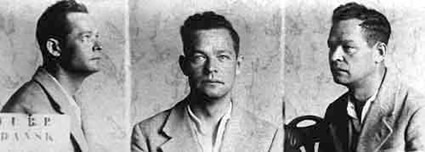 |
During 1920-1939 he was attached to the II Department of General Staff of Polish Army. Between 1923-1939, he was employed as a civil servant. On August 25, 1939 he was mobilized and assigned to the Boarder Security Corps. (pol. KOP – Korpus Ochrony Pogranicza) with a rank of sergeant. Feliks Selmanowicz took active part in defense operations. After the hostilities ended, he was interned by Latvian government; escaped and came into contact with underground. In January 1940 he was arrested by Latvian police and released after 12 weeks for lack of evidence. From January 1944, he was a soldier of the III Wilno Brigade of Home Army under Gracjan Frog “Szczerbiec”, transferred to V Wilno Brigade of Home Army commanded by Zygmunt Zendzielarz “Lupaszka”, where he served as second in command of a platoon. Promoted to Second Lieutenant Cz. W. [during the war times - pol. cz.w - czasu wojny]; wounded in combat, commanded IV Brigade company commanded by Longin Wojciechowski “Ronin” where he remained until the brigade was disarmed by Soviets on July 18, 1944. Interned at Kaluga, but managed to escape on April 20, 1945. During 1945-1946 established contact with “Lupaszka” and V Wilno Brigade of the Home Army where he took command of an independent 5-men reconnaissance and diversion unit responsible for acquisition of provisions for the brigade. From March to August 1946 his unit conducted many expropriation activities in Gdansk, Olsztyn, and Tczewo as a result of which his unit secured two hand pistols and money which were delivered to underground units operating in the area. On orders from Major “Lupaszka”, from May 1946, “Zagonczyk” was responsible for propaganda efforts, among which was publication and distribution of 900 leaflets addressed to the communist soldiers. Arrested on July 11, 1946 in Gdansk, he was charged with possession of firearms, membership in outlawed organization, political subversion, issuing orders, armed assaults, as well as publishing and distribution of illegal leaflets. An improvised summary trial took place on August 18, 1946 before the Gdansk’s District Military Court. The plea for clemency was rejected by Bierut and the death sentence was carried out - even before it was reviewed. The execution was carried out on August 28, 1946 in the jail’s basement. Feliks Selmanowicz was awarded the Central Latvia Army Cross(pol. Krzyz Wojsk Litwy Srodkowej), Medal for 1918-1920 War (pol. Medal za Wojne 1918-1920), the Service Medal (pol. Medal za Dlugoletnia Sluzbe), the Tenth Anniversary Medal (1932) (pol. Medal Dziesieciolecia), and the Cross of Valor (pol. Krzyz Walecznych) in 1944.
Murdered For the Second TimeAs if it wasn't enough that they were already murdered, their memory was being desecrated for years in the communist publications, where they were depicted as common criminals. In fact, it wasn't any different for the rest of the "Lupaszka's" Brigade, even at the beginning of the last decade - and well into the 90s. In 1969 the book, "A frontline without trenches" (pol. "Front bez okopow") was published in Gdansk by Jan Bobczenko (former head of the Koscierzyn's UB office - Ministry of Public Security). It was heavily tainted with false UB propaganda, e.g that "Inka" for example, participated in the execution of UB functionaries at Stara Kiszewa. |
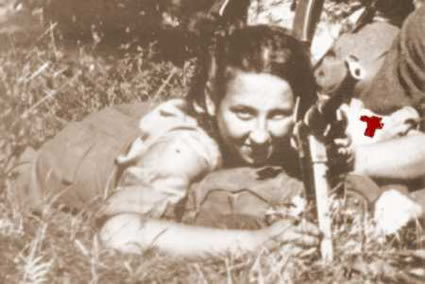 Danuta Siedzikowna "Inka", Medic in the V Wilno Brigade of the Home Army. Danuta Siedzikowna "Inka", Medic in the V Wilno Brigade of the Home Army. |
She is depicted as having a "sadistic smile" on her face, is "stocky", "of "dark complexion", and has a "scar" on her cheek. In her hand sparkles "oxidized black steel of a revolver". (page 189) This entire scene is of course made up, as in reality, "Inka" was a slim, attractive brunette and didn't have a scar on her face. "Inka” never shot at anyone …!
The Way
A unique and disturbing account of Rev. Prusak constitutes a valuable addition to our story about the secrets of the Polish secret police underground prison dungeons at the Kurkowa Street ("Bulletin of IPN nr. 2 and 3). Father Prusak, was an active participant in the Warsaw Uprising - accused of espionage, he found himself in prison in 1949. Sentenced to 6 years, he served 3.5 years. He says that he lived this long to be able to tell the story of "Inka", and because "God wanted that ..."
Narrative by Rev. Marian Prusak:
The Confession"This was my one and only time giving Last Rites before the execution. When I found myself at the jail [at Kurkowa Street], I sat in isolation for maybe an hour. After that, they came for me - I was living through what was to come. The jail's section head (pol. Oddzialowy) first lead me to this man (Feliks Selmonowicz). When I entered the cell, I saw this bitterly sad look on his face. The first words with which he greeted me were 'Oh well, they didn't commute my sentence ...' I heard his confession. He was at peace. Maybe he was only hiding being nervous, but he didn't show it on the outside. During this entire time I was bothered by the realization that they [the secret police] might be observing us through the pinhole. 'Then I was lead (I don't remember how, because I was dazed) to the cell in which a young, slim girl was wearing summer dress. She [Danuta Siedzikowna] was awaiting her death. She received me very calmly, confessed, and then asked me for a favor. She wanted me to let her sister know about her sentence and her death. She was saying this as if she was still confessing. We both felt that they might be observing us. She gave me an address in Gdansk Wrzeszcz, near the Institute of Technology, on Wlasna Strzecha Street. I couldn't write anything down, and I tried to remember this address. At the same time she told me that she sent a card to notify [her family], but didn't know if it will reach them. She didn't say anything else, and didn't complain about anything. The face of the girl, I remember as through the fog; the face of the man, I remember very well. He was closed up, tense, and profoundly affected by the approaching death. 'Inka' didn't say anything at all. Maybe, if I was better prepared and asked something. But, it was a completely new experience for me; I didn't know how to act. Later they [the UB] took me downstairs where I was before. I waited again, maybe an hour? A person in such situation looses sense of time. It was night. When I was incarcerated [myself at the later time], I was told that the executions were carried out during night, and not in the morning). In the end I was lead through a narrow descent into what looked like a cellar." Into the Traitors of the Motherland …"They were already there. I think they were handcuffed, or had their hands tied. I had a crucifix with me and gave it to them to kiss. They [the UB] wanted to cover their eyes, but they [the sentenced] refused. Near them waited a bunch of men so it was little crowded. There was a military prosecutor and many young UB men. They placed these two unfortunate ones against small stakes. In the corner was a small table where the prosecutor read decision for the sentence, and gave order to carry out the execution. There was, what looked like, a small recess, bare red bricks, there were stakes about half a man’s height. They stood them against them; I don’t remember if they were tied to them. Those who were there didn't respect the seriousness of the moment. They were shouting obscenities towards the condemned while the prosecutor read the sentence and announced that the request for commutation was rejected. His last words were: 'Into the traitors of the motherland, fire!' At this moment the condemned shouted, as if they had earlier agreed: 'Long live Poland!' After that guns fired, they slumped to the ground. Two or three soldiers shot; I think with Pe-Pe-Sha [PPSh-41 - Soviet submachine gun], from a short distance of maybe 3-4 meters. I remember that the floor was red, made of what looked like tiles; in the middle was a small groove, I think to allow blood to drain out. They [“Inka” and “Zagonczyk”] collapsed. I couldn't look at it, but I remember that both of them were still alive. Then, an officer approached and finished them off with a shot to the head. I don’t know who it was. I couldn't bare it. I remember only that a name was mentioned; I think Suchocki, and that this man wore a uniform. I tend to think that it was the prosecutor who [earlier] red the sentence . I stood surrounded by a group of people around me, and my view was somewhat obstructed. I didn't know that next to me stood a doctor. Later, I had to sign a statement about the execution. Right after that they lead me out. I don’t remember how I got to the car; I don’t know if I was riding with those who brought me there. No one spoke to me in the car". The Message"I didn't bring information about 'Inka's' death to her sister right away. For a whole week I lived in shock. At the end I collected myself; and in regular clothes, in the afternoon, I knocked on the door to her flat. The door opened; there were about 10 people there; they were young. I stated that I would like to speak with the woman of the house. A woman older than them stepped forward and I gave her the information. She responded: 'We know, the card came.' This was it. I returned home. When I was later arrested, they [the UB] reminded me about this visit during investigation. Therefore, I was continuously under surveillance. I didn't share this with many people. I didn't even tell my own family. I kept it inside of me. I lived through the death of 'Inka' and 'Zagonczyk' as if they were closest to me. I am glad that now I am able to tell about it, and that that the memory of these people will not perish." |
***
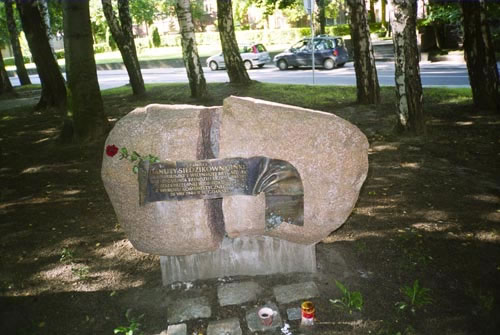 |
Photo left: Monument erected in memory of Danuta Siedzikowna “Inka”, the Home Army Street in Sopot, Poland. (1) Most likely Major Wiktor Suchocki, prosecutor of the District Military Court in Gdansk. (2) Reverend Marian Prusak is perhaps in error, as the commanding officer of the firing squad was Franciszek Sawicki. |
|
|
Home | About Doomed Soldiers | FAQ | Contact Us | Search | SiteMap | Polish Translation | Introduction | Dictionary of Terms | Torture Methods | About Jozef Kuras | In Search of Kuras's Remains | UB Murders | Volunteer For Auschwitz | Wiarusy | Baran Forests Murders | Liquidation of "Bartek's" Unit | The Augustow Roundup | Lt. "Mlot" Interview | A. Kiszka Interview | AK-WiN Counterintelligence | Propaganda An Anti-Semitism | Polish Secret Police | History Books | History Websites | Administrative Units | Law | Prisons | Executions | Surkonty Battle | Surkonty Battle pt. 2 | Stalin's Secret Order | National Armed Forces Introduction | Enemies & Allies | Occupiers | Lies by Omission | Living And Suriving As Partisan | Memoirs of Szkot | Freedom Independence |
